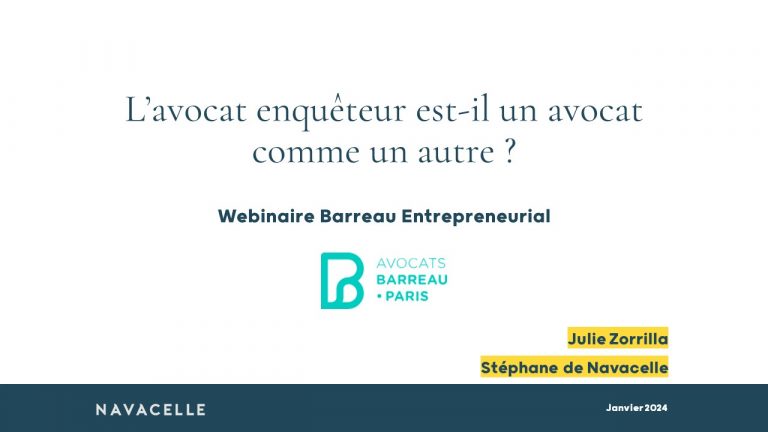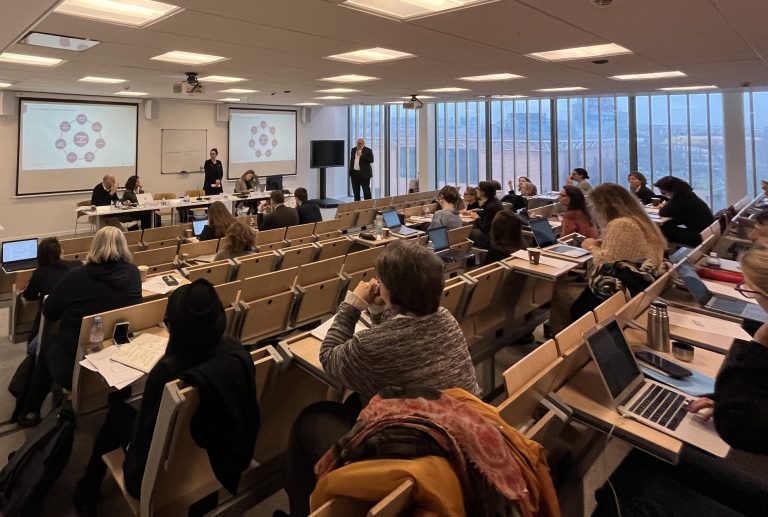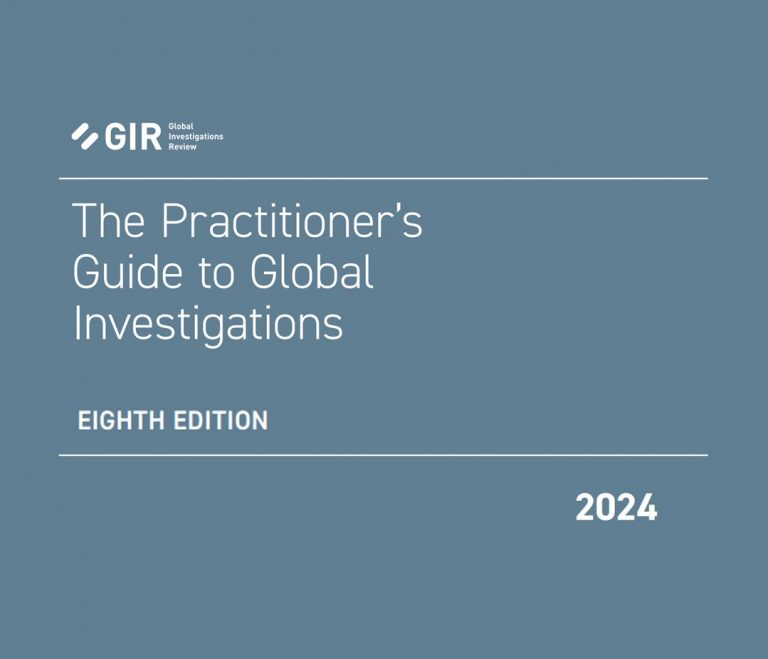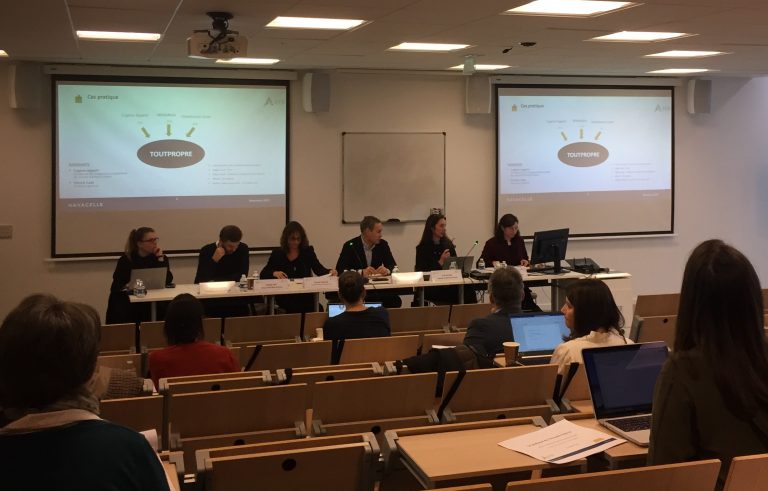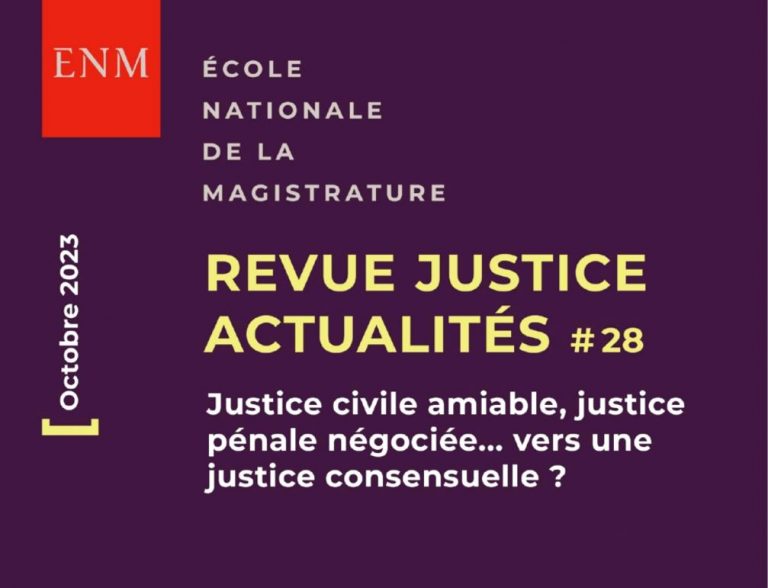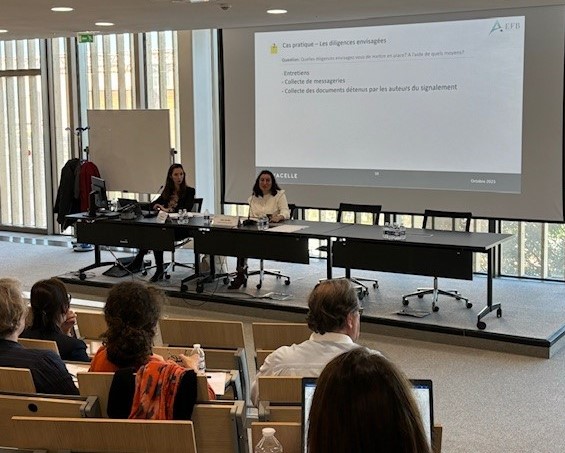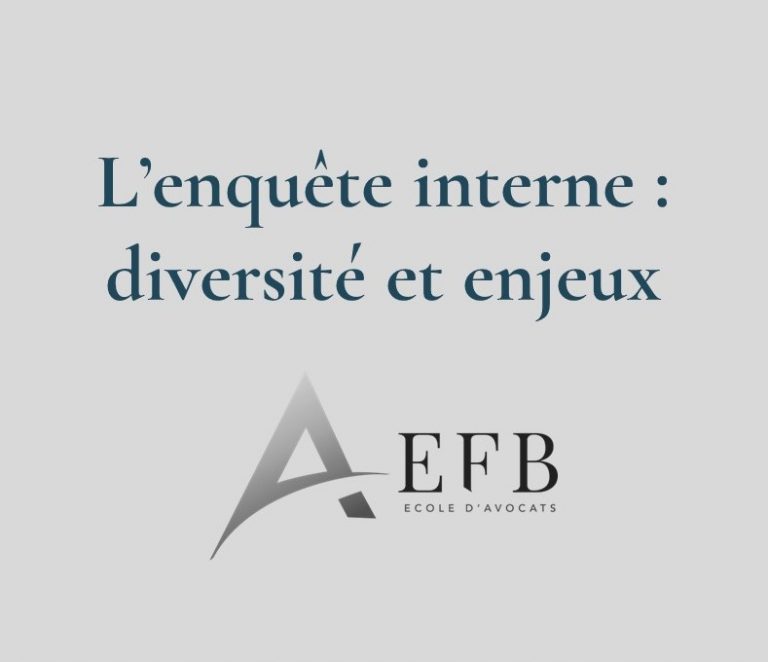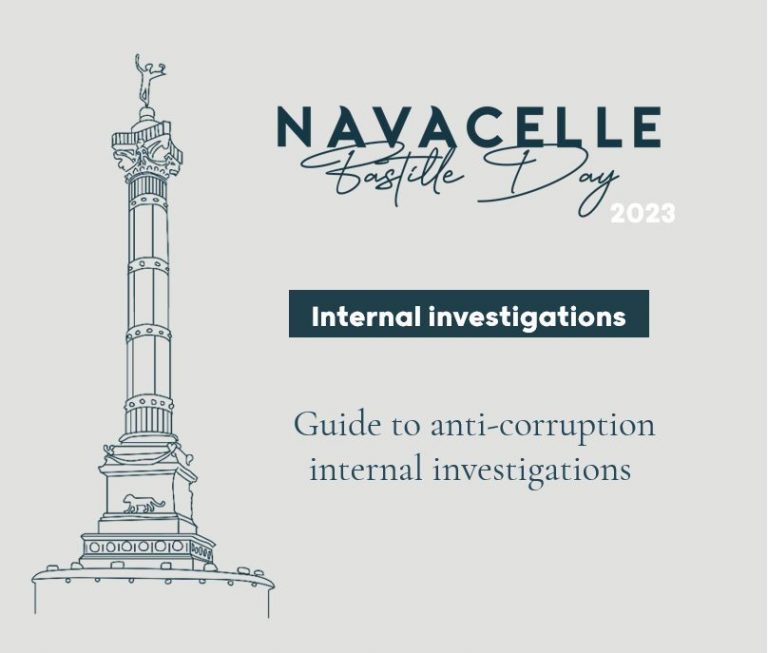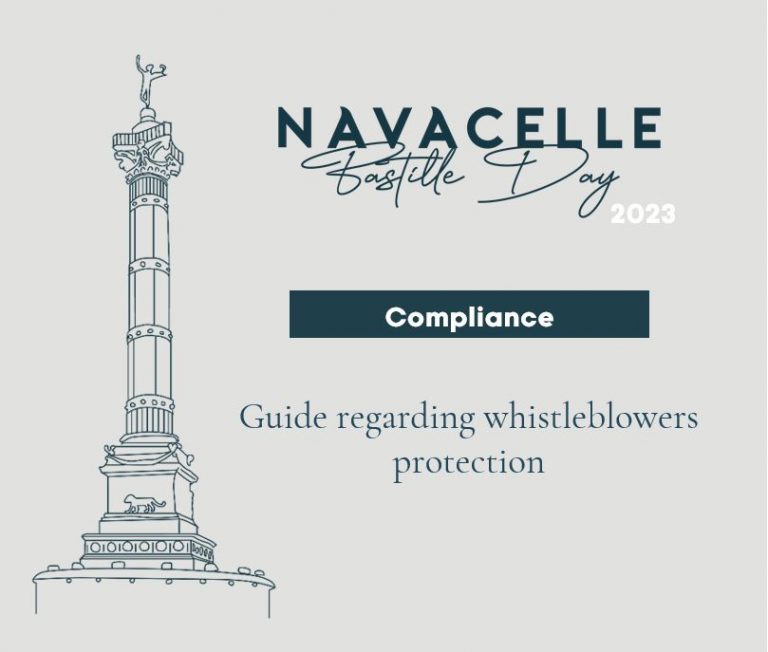The internal investigation flourished with the Sapin II law of 2016 and found its place within the cooperation with the French authorities following the Airbus case. As a genuine risk management tool, it can be deployed for any type of fraud or suspicion of borderline practices in a company. This is an opportunity for lawyers to offer strong guarantees to the companies concerned, particularly in terms of independence and confidentiality, during the conduct of investigations. How does an internal investigation proceed? What are the particularities of the lawyer-investigator’s duties? Why is it in the interest of the company’s management to call upon an external investigator? How to build a relationship of trust with the client company?
All these questions from the editorial staff of the Village de la Justice were answered by Stéphane de Navacelle, Delegate of the President of the Bar to influence through law and Julie Zorrilla, lawyers at the Paris Bar (Navacelle law firm).
***
Can you remind us of what the internal investigation consists of? Is this a new practice for companies?
The internal investigation was introduced in France under the influence of the Anglo-Saxon practice and was first used in banking law, competition law and labor law before being used in criminal matters. It is increasingly used in the latter field where it is experiencing a new boom.
This expansion began with cases in which French companies (or companies present on French territory) were being prosecuted by US or UK authorities. Then we have turned to a real enthusiasm for the internal investigation with the Sapin 2 law of December 2016 and the expectations of cooperation set forth by the Parquet National Financier (PNF) and the French Anti-Corruption Agency (AFA) in their joint guidelines of June 2019 [1].
The internal investigation consists of a set of investigative actions carried out by a company with the objective of uncovering the reality, extent and classification of facts detected or alleged to be in violation of the law and/or the company’s internal rules. The internal investigation enables the company to assess the reality of the facts reported and the risk incurred, whether operational, reputational, or legal, and to determine the measures to be taken to put an end to or limit the risks, particularly in the event of established facts contravening the law.
“The internal investigation enables to assess the reality of the reported facts and the risk incurred, whether operational, reputational or legal”.
The allegations may include, but are not limited to, claims of corruption. Allegations of harassment, fraud, and more broadly of non-compliance with standards may give rise to an internal investigation in the corporate and business world.
Let’s take an example: a large French group sells an important subsidiary to an American group. A very basic pre-acquisition due diligence was carried out for reasons of discretion and speed. In a post-acquisition due diligence, we realize that there is a risk of significant fraud that could cause the company to lose value. Things can then quickly get out of hand.
“To clarify things, there is a need for facts and not passionate speculation”.
To ease the situation and clarify things, there is a need for facts and not passionate speculation. The best thing to do is to ask an independent third party with strong ethical guarantees to shed light on what is happening or what has happened.
In the context of an internal investigation highlighting a problem, the question is not really whether, but when this problem will come to the surface. While it is certain that facts for which a real problem has been highlighted can indeed go “under the radar”, one must nevertheless be prepared if it does come out, because it can happen quickly, particularly through social networks or the media, and we have already seen legal cases opened following press reports, particularly when the facts seem credible. We must be able to respond to these “leaks” but without asserting things we are not aware of. One of the answers is to say, when this is the case, “we have set up an independent internal investigation, etc.”.
What are the particularities of the lawyer-investigator’s work?
Internal investigation work is first and foremost a question of sincerity and credibility. It is very difficult because, in practical terms, you are asking your client, the company, to expose itself and to carry out a team effort using an imposed method that differs from the traditional criminal defense.
However, it is important to remember that whenever there is legal advice, the lawyer is bound by professional secrecy, thus allowing for the essential confidentiality. And in the framework of the internal investigation, it is true that we are in an exercise that is somewhat singular and that presents differences with the classic conception of the criminal lawyer. Yet, it also has similarities with the traditional criminal defense.
The main specificity is that the lawyer does not work on the basis of a criminal file established by a prosecuting authority but is the one who feeds the file and whose mission is to shed light on the reality and the extent of the alleged facts. Another particularity is that the internal investigation takes place when the facts are discovered by the company. The exercise is then the same as in any other case: on the basis of this file, the client’s legal risk is assessed.
Once the file has been compiled and the risks have been assessed, the investigating lawyer will send the company recommendations for corrective measures to put an end to the breaches observed and prevent their reoccurrence. The conclusions of this investigation will be presented in an internal investigation report.
Sometimes, it is necessary to explain with pedagogy and convince the client company of the internal investigation method, reminding them that they alone are responsible for deciding what action to take.
The client must be fully involved in the internal investigation, and this is achieved at the very beginning of the process. There is a time needed for this education and specially to determine the client’s expectations. This time is very precious, even if we are often in an emergency. Indeed, this time will determine the whole process and will allow us to guarantee a methodological and serious work, and to avoid all possible misunderstandings.
What can be the outcomes of an internal investigation?
There are two temporalities in the internal investigation. Indeed, the internal investigation can be autonomous or coexist with an investigation conducted by an authority. If it coexists with a preliminary investigation, for example, the consequences are decided on the basis of this public investigation. If it is autonomous, the client will have to make decisions at the end of the internal investigation and make choices.
A first option is to implement remedial measures (which happens most often) or to make a procedural choice: either to wait and see if the authorities get wind of what has happened within the company and to notify them at that time, or to take the lead and self-disclose.
In such cases, the choice may be to cooperate with the prosecuting authorities: either through full involvement in providing information to these authorities, or through self-reporting, an action that is rarely considered in the criminal defense tradition. If a public investigation is opened, there can be a real system of exchanges between the client and the judicial authorities, in the framework of a “negotiation” that can lead, for example, to a judicial agreement in the public interest (CIJP) or an appearance on preliminary recognition of guilt (CRPC). But this is very new and still very much on the background of French culture, even if the practice has found its legitimacy with the Airbus case.
The cooperation requirement, not provided for in the Sapin 2 law, was outlined by the joint guidelines in 2019 of the PNF and the AFA. These guidelines in fact postulate the cooperation of the respondent entity as a prerequisite for obtaining a CJIP [2]. Thus, in the name of this cooperation, the transmission of the conclusions of the internal investigation must take place “within a timeframe compatible with the requirements of the judicial investigation” [3]. Moreover, the spontaneous disclosure of the facts by the company is expected within a “reasonable time” by the public prosecutor. The position of the French authorities with respect to cooperation has thus been set. For the defense, if cooperation calls into question the traditional balance of the French criminal defense opposing the defense to the prosecution authority, it becomes the central element of an exchange that is no longer opposed but negotiated between the lawyer and the prosecution. Thus, when a lawyer-investigator has to obtain a negotiated settlement, cooperation becomes consubstantial to his mission.
It is undeniable that the Airbus case has laid the foundations for cooperation “à la française” between the defense and the prosecuting authority, but it cannot become an absolute rule of defense. The criminal lawyer must remain the protector of his client’s interests after having analyzed the applicable rules. Thus, the interests of the client must come first. However, cooperation is not always the best defense. Thus, the hearing must remain a possibility in particular as it allows the debate on the legal rigor of the prosecution, chasing out of the criminal file the approximation, the irregularity of procedure or the simple deduction in favour of the evidence, the follow-up of the rules of procedure and a contradictory debate.
What obstacles can the lawyer encounter in conducting an internal investigation? How to build a relationship of trust with the client company?
Many obstacles may be encountered during an internal investigation, depending on the case. For example, there may be a reluctance on the part of employees or a form of silence within the company’s departments regarding the facts in question. The implementation of the investigation may also be affected by a difficult social context or the existence of major economic stakes.
However, the most frequent obstacle is the governance of the company. Indeed, in addition to the necessary identification of his interlocutor, the investigating lawyer must identify his client and the latter’s interests. Depending on the organization of the company and the nature of the facts in question, the investigating lawyer may be contacted by the legal department, the general management or even a compliance department. He will therefore have to determine who will be his interlocutor in the conduct of the investigation, but above all identify his client: in certain contexts of joint-venture, takeover, or reorganization, where several entities coexist, it is essential to determine which entity is the client and what are the interests of this entity. In addition to the stakes and interests involved, the existence of a potential conflict of interest must be anticipated in order to guarantee the integrity and seriousness of the internal investigation.
“The lawyer must first of all identify his client and his interests”.
Finally, it is sometimes difficult, in the relationship with the clients, to make them understand that we are independent: we are there to respond to their instruction to carry out an internal investigation. But, within the framework of the internal investigation mission, we are completely independent and it is this independence that guarantees the solidity of the mission and, in the end, allows us to best protect the client’s interests.
What safeguards does an investigative lawyer offer to ensure the integrity of an internal investigation?
The first advantage is obviously that the lawyer is bound by the professional secrecy that binds him to his client [4] and he cannot be released from it, not even by his client, except in his own defense. However, the PNF and AFA guidelines on the implementation of the CJIP have stated that “not all elements contained in the internal investigation report are necessarily covered by the lawyer’s professional secrecy”. It is added that “[i]f the company refuses to transmit certain documents, it is up to the public prosecutor’s office to determine whether this refusal appears justified in light of the rules applicable to this secrecy. In the event of disagreement, the public prosecutor shall assess whether the failure to hand over the documents at issue has an adverse effect on the company’s level of cooperation. This assessment shall take into account, where applicable, the legal consequences that the waiver of professional secrecy could have under foreign law” [5]. The Paris Bar Association, in its report on the problems and issues related to the status and role of the lawyer-investigator in the context of an internal investigation of December 10, 2019, therefore reaffirmed that the lawyer in charge of an internal investigation is bound by professional secrecy with respect to his client and that all documents drawn up in the context of his mission are covered by this secrecy [6].
“The first advantage is obviously that the lawyer is obliged by the professional secrecy that binds him to his client”.
This position of the Order and the lawyers is definitive. Nevertheless, the magistrates have not yet confirmed this position and the mystery still remains, since the Court of Cassation tends to limit the professional secrecy of lawyers [7] and in the June 2019 guidelines, the PNF and the AFA consider that all elements exchanged in the framework of the internal investigation between the lawyer and his client are not covered by professional secrecy… But for us, it is crucial, for our profession, and obviously for the interests of our clients, to maintain that all of our written or oral communications are covered by professional secrecy. This is all the more important because the objective of access to information exchanged within the framework of the internal investigation can be achieved in a completely different way within the framework of cooperation, if the client decides to communicate information. So, with these indications in these guidelines on professional secrecy, we may have created a difficulty where, in practice, there is not necessarily one.
More generally, the lawyer, as an auxiliary of justice, is bound by the ethical principles applicable to the profession. These principles enable him to ensure the integrity of the internal investigation. In addition to professional secrecy, the investigating lawyer is bound by the principle of independence, which makes him the guardian of the integrity of internal investigations conducted by lawyers. The investigating lawyer will carry out his mission in complete independence in compliance with the rules applicable to the internal investigation, independently of any instructions received from his client which could have the effect of orienting the investigation. Probity is also an undeniable tool. In addition to the internal investigation itself, this probity engages the credibility of the investigating lawyer. This credibility and the seriousness of the lawyer’s work are two primordial elements, in particular to ensure a useful and fruitful exchange with the prosecuting authorities. Moreover, the lawyer benefits from the faith of the palace which binds all the auxiliary officers of justice, thus facilitating the exchanges necessary to obtain a negotiated agreement, while preserving the interests of his client.
Why should business leaders use a lawyer-investigator?
As we all know, when business leaders find themselves in this situation, whether it’s harassment or something else – a situation of criminal risk, to put it simply – with an employee, a manager, or a person on whom they rely on a daily basis, it’s a situation of distress and solitude. And it is very difficult to make decisions. Therefore, in this context and in order to help the leader to have the right reflexes, there are two options: either to rely on internal resources (HRD, Legal Department, etc.), or to get in touch with a lawyer, without necessarily being the one to carry out the investigation. However, it is essential that the investigation be conducted methodically if it is to be valid.
“It’s a misguided reflex to think that I’ll do the investigation myself”.
It is a misguided reflex to think “I’ll do the investigation myself”. If only because it means exposing yourself, as a leader, to having made a bad decision. More precisely, you must avoid becoming a non-objective actor of the facts, because the way in which the facts are dealt with will increasingly determine the alternatives on which you will be able to rely to find a solution. However, by intervening oneself, one prevents oneself from benefiting from a CJIP or a CRPC. The urgent thing here is to put some distance between yourself and the case, a distance that is essential in a situation where you are both judge and party.
Outside counsel is the most neutral and trusted third party. In defending the client’s interests, it is important that the internal investigation report be protected from any criticism that may be made.
“The outside lawyer is the most neutral and trusted third party”.
In practice, one must be aware that lawyers conducting investigations are under considerable pressure to “whitewash” their clients and this is a temptation against which the lawyer must guard. And as we can see in ethics, conflicts can arise from the internal investigation. Beyond that, when your client solicits you for an internal investigation because you are already assisting him in consulting/litigation, we are at the limit of the conflict of interest. Let’s take the example of a firm that has set up a compliance program and that would be solicited by this client regarding a violation of the compliance program or a phase of the compliance program. Can one really be independent to evaluate one’s own work, to audit things one has implemented? Moreover, even if the job is well done, there may be suspicions of giving satisfaction or misleading reports. However, the most important thing that will allow us to build this file in the most reliable way is the independence and the credibility of the lawyer, independence being one of the first values in the work of internal investigation.
Propos recueillis par A. Dorange



